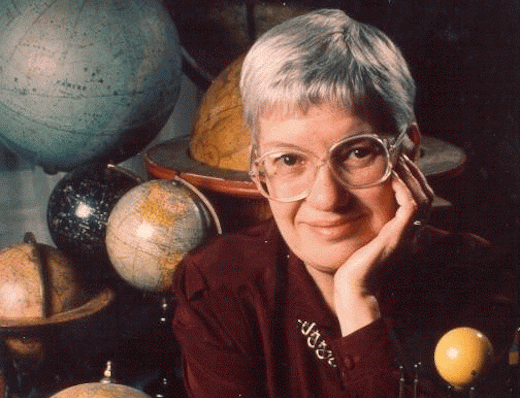It's the 1970s. Sean Connery is still James Bond, fashion is blindingly ugly,
上世纪70年代的时候,肖恩·康纳利还在饰演詹姆斯·邦德;那时候所谓的时尚现在看来都不堪入目;
and astronomers are working tirelessly to solve the galactic rotation problem,
那时候的宇航员还在夙兴夜寐地努力解决星系自转的问题。
which is actually a very misleading name, because the problem was that galaxies rotated too well.
这个问题的名字听起来非常具有误导性,因为问题其实不是星系自转,而是星系自转得太快了。
The stars on the outskirts of galaxies were orbiting much faster than astronomers expected,
星系外围的星体,其运行速度要比天文学家想象得更快,
and they were starting to question what they thought they knew about the laws of physics.
所以天文学家开始质疑自己对于物理定律究竟知道多少。
Eventually, they realized that they were looking at the first direct evidence for dark matter.
最后,他们终于意识到他们观测的是暗物质存在的第一个直接的证据。
And it was an astronomer named Vera Rubin who found it.
发现它的天文学家名为薇拉·鲁宾。
Rubin was born in 1928 in Philadelphia, Pennsylvania, and she loved to stargaze as a kid,
1928年,鲁宾出生于宾夕法尼亚州的费城,她自小就喜欢眺望星辰,
she was especially fascinated by how the stars would move through the sky overnight.
她尤其对各个星体夜间在天空中移动的方式感兴趣。
Her father, who was an electrical engineer, helped her make a telescope when she was 14, and she started going to meetings for amateur astronomers.
鲁宾的父亲是一名电气工程师。鲁宾14岁的时候,父亲帮她做了一个望远镜。后来,她开始参加天文爱好者的各种见面会。
In interviews, she used to claim that she faked her way through high school, since she turned every assignment into an excuse to write about astronomy.
在多次采访中,鲁宾都表示自己的高中是靠撒谎混过去的,因为她每次不写作业的理由都是要写天文学的东西。
That passion for the stars carried her to Vassar College in New York,
她凭着对天文学的热爱考进了纽约的瓦萨学院,
which she chose because one of her awesome astronomer forebears, Maria Mitchell, had taught there.
她选择这家大学的原因是她最喜欢的一名天文学家前辈玛丽亚·米切尔曾在这里教书。
From there, she got a master's degree in astronomy from Cornell, and a PhD from Georgetown.
随后,她在康奈尔大学获得了天文学硕士学位,在乔治城大学获得了博士学位。
Her master's thesis involved analyzing the movements of more than a hundred galaxies,
她的硕士毕业论文涉及到分析100多个星系的运转,
and her PhD looked into how galaxies are distributed through the universe.
她的博士毕业论文则研究了星系在宇宙间分布的方式。
Maybe you're starting to sense a theme here: she was really interested in galaxies.
您可能开始感受到今天的主题了,那就是:她真的对星系非常感兴趣。
After bouncing around between a few different professorships, Rubin landed at the Carnegie Institution in Washington, DC in 1965.
在不同地方担任了教授后,最后,鲁宾于1965年在华盛顿哥伦比亚特区的卡内基研究所落定。
It was there that she and fellow astronomer, Kent Ford, turned their attention to how stars orbited the centers of galaxies.
也正是在这所大学,鲁宾和她的同行肯特·福特将注意力转向星体围绕星系中心旋转的方式。
Ford had invented a more sensitive kind of spectrometer, a tool that splits up the light detected by a telescope based on its wavelength.
福特发明了一种灵敏度更高的分光仪,这种工具可以根据望远镜检测到的光的波长来对其进行分离。
Rubin and Ford used it to calculate how fast different parts of galaxies were moving.
鲁宾和福特通过该分光仪计算了星系各个不同部分运动的速度。
When they plotted the stars' orbital velocities across a galaxy, they expected to see that the stars close to the center orbited really fast,
他们划分出各个星体在星系中的轨道速度后,他们认为能看到的结果是:离星系中心近的星体,轨道速度快;

with orbits getting slower and slower the farther the stars were from the center.
离星系中心越远的星体,轨道速度越慢。
Like how in our solar system, Mercury moves much more quickly in its orbit around the Sun than Neptune does.
他们认为会与我们的太阳系也类似:水星和海王星都围着太阳转,但水星的轨道速度就比海王星快。
But that's not what they saw. They found that stars on the edges of galaxies were orbiting just as quickly as the stars closer in.
但他们观测到的结果并非如此,他们发现,星系边缘的星体,其轨道速度和离中心更近的星体一样快。
It made no sense. The stars on the outskirts of these galaxies were orbiting so fast that the galaxies should have basically flown apart,
这在理论上说不通,星系边缘的星体,其旋转速度若是有如此之快,那整个星系应该都分崩离析了,
the mass of all the matter that they could see in each galaxy shouldn't have been enough to hold them together.
因为他们在每个星系里能看到的所有物质的质量不足以使他们整合在一起。
Now, Rubin and Ford weren't the first people to notice some odd galactic motions.
如今,鲁宾和福特不是第一批注意到一些怪异星系运动现象的人了。
There had been a few isolated observations earlier in the century.
20世纪初,还有一些天文学家各自观测到了一些现象。
For example, in the 1930s, American astronomer Horace Babcock observed that the nearby Andromeda galaxy was spinning way too fast.
比如,20世纪30年代的时候,美国天文学家胡瑞斯·拜勃库克观测到,银河系附近的仙女座旋转速度也非常快。
Jan Oort, the Dutch astronomer who the Oort Cloud is named after, saw something similar with the Spindle Galaxy in the constellation Sextans,
简·奥尔特是荷兰的天文学家,奥尔特云就是以他的名字命名的。奥尔特发现,六分仪座中的纺锤状星系也存在类似的现象;
and so did a Swiss astronomer named Fritz Zwicky, in some of the galaxies in the Coma galaxy cluster.
瑞士天文学家弗里茨·兹威基在后发星系团中的一些星系里也发现了这种现象。
They came up with a few different explanations for this behavior. Babcock thought it might have to do with light absorption,
他们对于这种情况有几种不同的解释。拜勃库克认为可能与光吸收有关,
or maybe that objects on the outskirts of galaxies had some different dynamics that we didn't have the math yet to describe.
又或者星系边缘的物体,其运动方式有所不同,而数学也无法解释。
Oort and Zwicky both independently suggested that there were halos of non-luminous matter around the galaxies, aka dark matter.
奥尔特和兹威基分别独立地提出,星系中存在不发光物质产生的光晕。这种不发光物质就是暗物质。
What Rubin and Ford discovered was that this problem didn't just exist for one or two galaxies at a time.
鲁宾和福特发现,并不只是一两个星系存在这个现象。
It showed up all across the sky. Babcock, Oort, and Zwicky hadn't found some weird anomalies; they saw specific examples of a widespread phenomenon.
目之所及的星空里都存在这种现象,拜勃库克、奥尔特、兹威基并未发现什么奇怪的反常现象;他们看到的都是普遍存在现象里的几个特定的例子。
Rubin graphed the motions of these galaxies in rotation curves, plotting the velocities of objects from their centers out to their edges.
鲁宾画出了这些星系以自转曲线运动的图片,勾画出了物体从中心到外围的速度。
In the 1970s, she gathered and published a huge amount of data,
20世纪70年代,鲁宾收集并发表了大量数据,
showing clearly and incontrovertibly that the galactic rotation problem was typical galactic behavior,
以清晰而又无可辩驳的方式展现了星系自转中的这个问题其实是典型的星系行为,
and that there was some kind of unexplained physics at work.
其背后有未知的物理学原理在起作用。
She also realized that the dark matter hypothesis was consistent with her observations for all these galaxies.
鲁宾还意识到,暗物质的假设与她在所有星系里的观察结果相一致。
If there was a bunch of matter in them that we couldn't detect, that would explain why the galaxies were rotating so fast.
如果星系中存在一些我们无法检测到的物质,那就能解释星系旋转速度如此之快的原因了。
After that, astronomers started finding more and more evidence for dark matter,
在那之后,一些天文学极爱开始发现更多暗物质存在的证据,
and these days, most astronomers think that 84% of the matter in the universe is dark matter.
而目前,大多数天文学家都认为,宇宙里84%的物质都是暗物质。
Rubin died in December 2016 at the age of 88.
2016年12月,鲁宾去世,享年88岁。
Through her decades of work on galaxies and dark matter, she laid the foundation for what's now a huge field of research.
通过多年来对各个星系和暗物质的研究,鲁宾奠定了当前一个广泛研究领域的基础。
Astronomers still have no idea what dark matter is, and there are thousands of researchers all over the world trying to figure it out.
天文学家依然不知道暗物质是什么,而全球有很多研究人员依然在努力解开这个谜题。
So, in a lot of ways, Vera Rubin is still contributing to our knowledge of the universe.
所以,从很多方面来讲,薇拉·鲁宾都为人类了解宇宙做出了贡献。
Thanks for watching this episode of SciShow Space.
感谢收看本期的《太空科学秀》。
And for more on dark matter, check out our video What we don't know about dark matter,
如果您想了解更多关于暗物质的知识,可以观看视频《你所不知的暗物质》,
which explores some of the possibilities astronomers have considered over the years.
里面讲解了多年来天文学家思考过的可能性。












